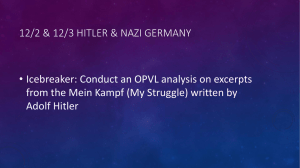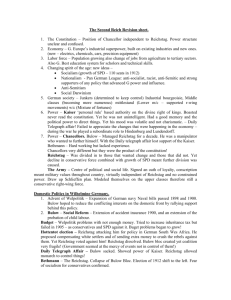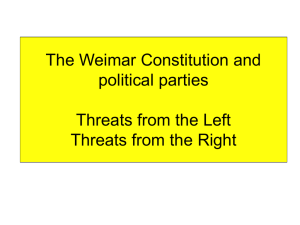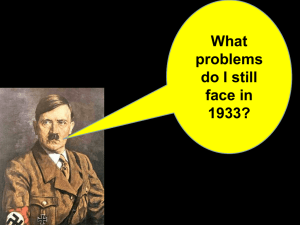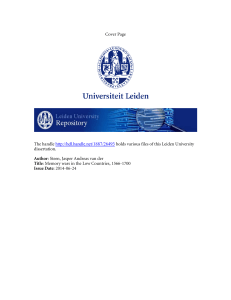Marinus Van Der Lubbe
advertisement
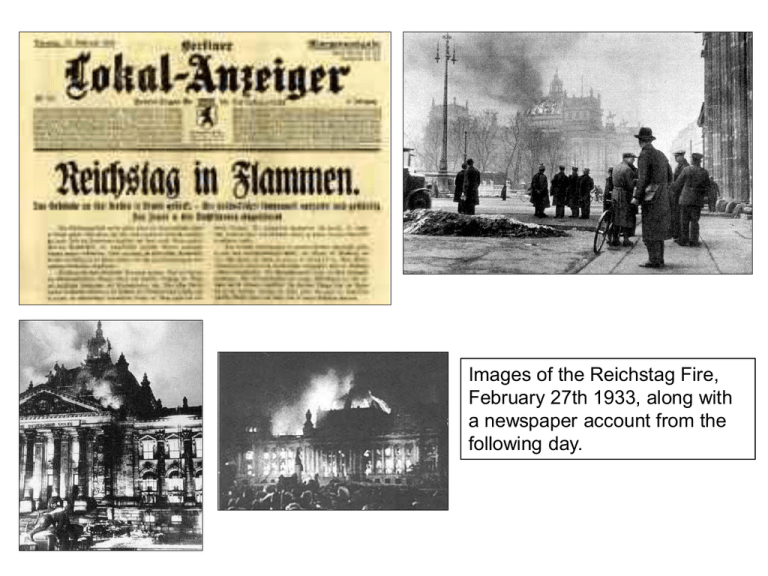
Images of the Reichstag Fire, February 27th 1933, along with a newspaper account from the following day. Account by Rudolf Diels, Chief of Police “When I arrived, a few officers of my department were already engaged in interrogating Van Der Lubbe. Naked from the waist up, smeared with dirt and sweating, he sat in front of them, breathing heavily. He panted as if he had completed a tremendous task. There was a wild triumphant gleam in the burning eyes of his pale, haggard young face. I sat opposite him several times that night and listened to his confused stories. I read the Communist pamphlets from his trouser pockets. His voluntary confessions prevented me from thinking that an arsonist who was such an expert in his folly needed any helpers. Why should not a single match be enough to set fire to the cold yet inflammable splendour of the Chamber, the heavy curtains and the bone-dry wooden panelling! But this specialist had used a whole knapsack full of inflammable material. He had been so active that he had laid several dozen fires.” Initial Nazi reaction, in the ruins of the Reichstag “Hitler stood leaning his arms on the stone parapet of the balcony and stared silently into the red sea of flames. Goring came towards me ‘this is the beginning of the Communist revolt, they will start their attack now! Not a moment must be lost’ “I reported on my interrogation of Van Der Lubbe, that in my opinion he was a maniac. Hitler ridiculed this, saying ‘this is something really cunning, prepared a long time ago. The criminals have thought all this out beautifully, but they’ve miscalculated…. There will be no mercy now. Anyone who stands in our way will be cut down.’ “Goring did not let me speak; ‘Police on an emergency footing; shoot to kill, and any other emergency regulations which might be appropriate in such a case.’” Extract from Rudolf Diels’ Account (Chief of Police) Hitler and Goering Marinus Van Der Lubbe (1909 - 1934) Marinus Van Der Lubbe was born in Holland. After an industrial accident that damaged his sight in 1926, he became active in Communist politics. After moving to Germany, he became increasingly involved in opposing Hitler. Throughout this period, he faced mental health problems. On 27 February 1933, he was found wandering round the burning Reichstag building, with matches in his pocket. He confessed to the arson, and was beheaded a year later and buried in an unmarked grave. From Ferriby and McCabe (2000): “Modern World History” “Van Der Lubbe was known to have been of limited intelligence and his interrogation by the Nazi-controlled police force may well have resulted in a forced confession. It is possible, although again not proven, that the Nazis themselves planned and set fire to the Reichstag. “There was an underground passage that ran from the SA offices into the Reichstag building, and so access to the Reichstag would have been easy. A few days before the fire, the SA had picked up Van Der Lubbe after hearing him boast that he planned to set fire to the Reichstag. It would have been easy to set him up to take the blame.” Hitler’s Statement, 28th February 1933 “This act of arson is the most outrageous act yet committed by Communism in Germany. The burning of the Reichstag was to have been the signal for a bloody uprising and civil war.” Emergency Decree: 28 February 1933 “For the Protection of of People and State: to guard against Communist acts of violence endangering the State” “Restrictions on personal liberty, on the right of free expression of opinion, including freedom of the press, on the right of association and assembly, and violations of the privacy of postal, telegraphic and telephonic communications, and warrants for house-searches, orders for confiscations as well as restrictions on property rights are permissible beyond the legal limits otherwise allowed.” Signed by President Hindbenburg, under Article 48 of the Weimar Constitutions Nazi accounts of the purpose of the fire, and the Middle Class response “Goering reported dryly and very gravely the dreadful murder plans of the Communists. Proof was brought to light by the hundredweight. Hostages from bourgeois circles, wives and children of police officers were to be taken and used as shields, all cultural monuments were to be destroyed as in Russia: palaces, museums, churches. [Goring said they] had started with the Reichstag, where fire broke out in 28 places … They wanted to send armed gangs to murder and start fires in the villages; in the meantime, terrorism was to take over the big cities stripped of their police forces. Poison, boiling water, every tool from the most refined to the most primitive were to be used as weapons. “Goering said he had not lost his nerve nor would he lose it. I hope the voters don’t lose their nerve and stay away from the polling booths out of fright.” From Frau Solmitz’s Diary, 1 March 1933 Goering in 1933 A German newspaper front page from 3rd March, 1933, announcing its own closure. Nazi Posters for the March 1933 Reichstag Election “The Reich will never be destroyed if you united and loyal” “In the deepest need Hindenburg chose Adolf Hitler for Reich Chancellor. You too should vote for Hitler” Reichstag Election Results, November 1932 and March 1933 1932 (Nov) 1933 (March) Nazis 33% 44% Social Democrats 20% 18% Communist 17% 12% Centre (Catholic) 12% 11% 9% 8% Nationalist (independent, pro-Nazi) Testimony from the Nuremburg War Crime Trials, 1945 “At a lunch on the birthday of the Fuhrer in 1942, the conversation turned to the topic of the Reichstag building. I heard with my own ears when Goering interrupted the conversation and shouted: ‘the only one who really knows about the Reichstag is me, because I set it on fire!’” General Halder (right)


